Most reliable "best" radio
-
Bingo! Scored it. Captured below is a single transmission using the Adafruit TPL5110 to power up a Wemos D1 Mini ESP8266 from essentially nothing (43na) and then return to essentially nothing (43na) afterward. So, this screenshot captures the entire process for an ESP8266 that's in ESP-NOW mode.
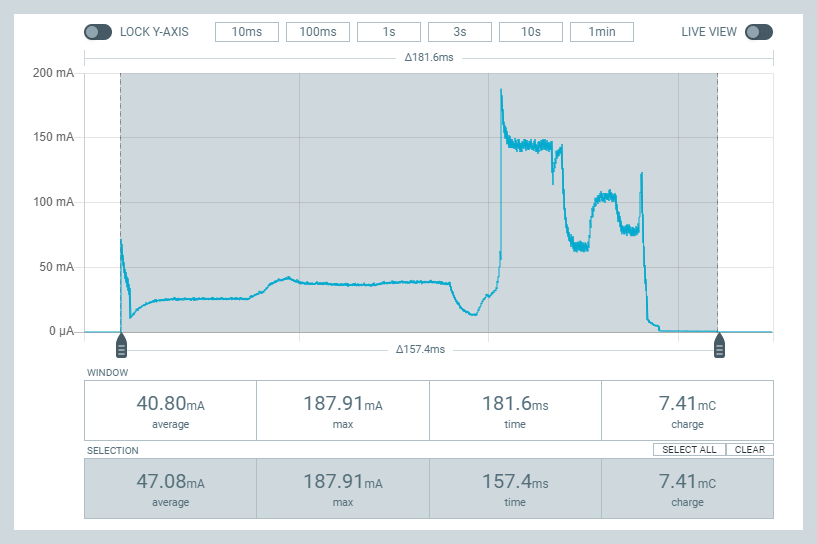
Here is the sketch that I used:/**************************************************************************************************************************************************** * TITLE: ESP-NOW Getting Started Examples * * By Frenoy Osburn * YouTube Video: https://youtu.be/_cNAsTB5JpM ****************************************************************************************************************************************************/ /******************************************************************************************************************** * Please make sure that you install the board support package for the ESP8266 boards. * You will need to add the following URL to your Arduino preferences. * Boards Manager URL: http://arduino.esp8266.com/stable/package_esp8266com_index.json ********************************************************************************************************************/ /******************************************************************************************************************** * Board Settings: * Board: "WeMos D1 R1 or Mini" * Upload Speed: "921600" * CPU Frequency: "80MHz" * Flash Size: "4MB (FS:@MB OTA:~1019KB)" * Debug Port: "Disabled" * Debug Level: "None" * VTables: "Flash" * IwIP Variant: "v2 Lower Memory" * Exception: "Legacy (new can return nullptr)" * Erase Flash: "Only Sketch" * SSL Support: "All SSL ciphers (most compatible)" * COM Port: Depends *On Your System* *********************************************************************************************************************/ #include<ESP8266WiFi.h> #include<espnow.h> #define MY_NAME "CONTROLLER_NODE" #define MY_ROLE ESP_NOW_ROLE_CONTROLLER // set the role of this device: CONTROLLER, SLAVE, COMBO #define RECEIVER_ROLE ESP_NOW_ROLE_SLAVE // set the role of the receiver #define WIFI_CHANNEL 1 uint8_t receiverAddress[] = {0xFF, 0xFF, 0xFF, 0xFF, 0xFF, 0xFF}; // please update this with the MAC address of the receiver struct __attribute__((packed)) dataPacket { int sensor1; int sensor2; float sensor3; }; void transmissionComplete(uint8_t *receiver_mac, uint8_t transmissionStatus) { if(transmissionStatus == 0) { //Serial.println("Data sent successfully"); digitalWrite(14,HIGH); } else { //Serial.print("Error code: "); //Serial.println(transmissionStatus); } } dataPacket packet; void setup() { pinMode(14,OUTPUT); digitalWrite(14,LOW); //Serial.begin(115200); // initialize serial port //Serial.println(); //Serial.println(); //Serial.println(); //Serial.print("Initializing..."); //Serial.println(MY_NAME); //Serial.print("My MAC address is: "); //Serial.println(WiFi.macAddress()); WiFi.mode(WIFI_STA); WiFi.disconnect(); // we do not want to connect to a WiFi network if(esp_now_init() != 0) { //Serial.println("ESP-NOW initialization failed"); return; } esp_now_set_self_role(MY_ROLE); esp_now_register_send_cb(transmissionComplete); // this function will get called once all data is sent esp_now_add_peer(receiverAddress, RECEIVER_ROLE, WIFI_CHANNEL, NULL, 0); packet.sensor1 = 123; //Serial.println("Initialized."); } void loop() { packet.sensor1++; packet.sensor2 = 456; packet.sensor3 = 3.14; esp_now_send(receiverAddress, (uint8_t *) &packet, sizeof(packet)); delay(1000); }It is only slightly modified from the original. Essentially I commented-out all of the code relating to print statements, because that would drag out the time and is superfluous for present purposes, and I set GPIO14 to high as the "DONE" signal after the packet was finished sending and the related callback function was called, which instructed the TPL5110 to cut the power.
So, I finally have the data now to do the necessary battery calculation. Crunching the numbers, assuming a single transmission like this every 5 minutes, the batteries would last almost 19 years. That is just a pure packet transmission with no acknowledgement. Still, it is much better than what I had been expecting based on what others have reported.
It might be that this could be improved upon by removing the ESP8266 from its Wemos D1 Mini PCB, as the PCB contains components which may be soaking up power and simply aren't needed. Also, looking at the current graph, it looks as though maybe it's listening after the main transmission? Maybe someone knowledgeable about ESP-NOW can comment. Lastly, I'm not sure what datarate ESP-NOW defaults to. Maybe it would be possible to have it transmit faster and thereby use less current. So, lots to look into if anyone here has the interest.
Anyhow, I think that this proves the concept. Who knew? All this time the ESP8266 had been type-cast as impossibly power hungry. I guess the main downside is that anything in addition that one might do, such as measuring the battery voltage or doing an TH measurement, as examples, will be done at a fairly high current burnrate. Offsetting that might (?) be the prospect of getting it done sooner.
The real question, though, is whether it makes sense to do a similar measurement on an ESP32, and, if so, which one? Any chance it would be better? Or would it likely be worse?
@NeverDie said in Most reliable "best" radio:
All this time the ESP8266 had been type-cast as impossibly power hungry. I guess the main downside is that anything in addition that one might do, such as measuring the battery voltage or doing an TH measurement, as examples, will be done at a fairly high current burnrate.
By turning off the 8266's radio and only using the CPU for TH, voltage, or any other measurement, considerable power savings result. I think I was getting down to the mid-teens of mA, instead of the 70 mA or so with the radio on. Another power savings came to me by saving up periodic readings, in like a table. Then every 50th reading, or so, turn radio back on and do a bulk-load to whatever database is desired, then turn off the radio and go to sleep. It was a kick to learn how to do this. Here is a posting I did at mathworks with more detail as it relates to loading to Thingspeak: https://www.mathworks.com/support/search.html/answers/890382-how-to-efficiently-transfer-bulk-upload-from-an-esp8266-to-thingspeak.html?fq[]=asset_type_name:answer&fq[]=category:thingspeak/write-data&page=1
I've seen several other uses of the ESP that exclude radio use and just implement the CPU. -
I'm getting no traction on this thread so I think I may move this topic to some other forum on some other website. Sorry. Maybe this is just the wrong place for it, or maybe the topic is of no interest to others here. Whatever the reason, monologging is no fun. There just isn't the feedback or comments or suggestions to make further posting on this topic worthwhile.
End of thread.
@NeverDie said in Most reliable "best" radio:
I'm getting no traction here so I think I may move this to some other forum on some other website. Sorry. Maybe this is just the wrong place for it, or maybe the topic is of no interest to others here. Whatever the reason, monologging is no fun. There just isn't the feedback or comments or suggestions to make further posting on this topic worthwhile.
End of thread.Just saw this after my last post. Well, sorry to see this end and thank you for all the work. I've been so consumed on your SX1280 thread, and buying equipment that I haven't been back for a while. Regrets.
-
Curiously, this keyfinder does appear to function fairly decently all the way down to 1.9v:
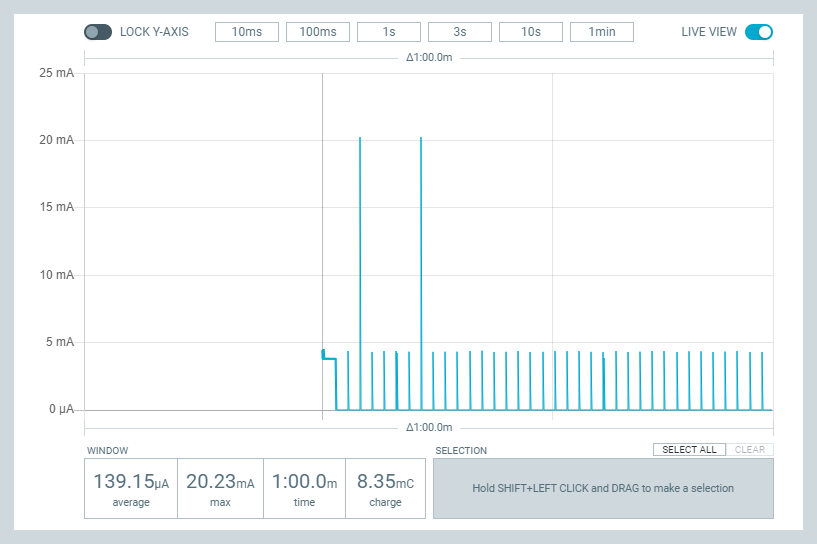
and its current draw actually drops to 29ua:
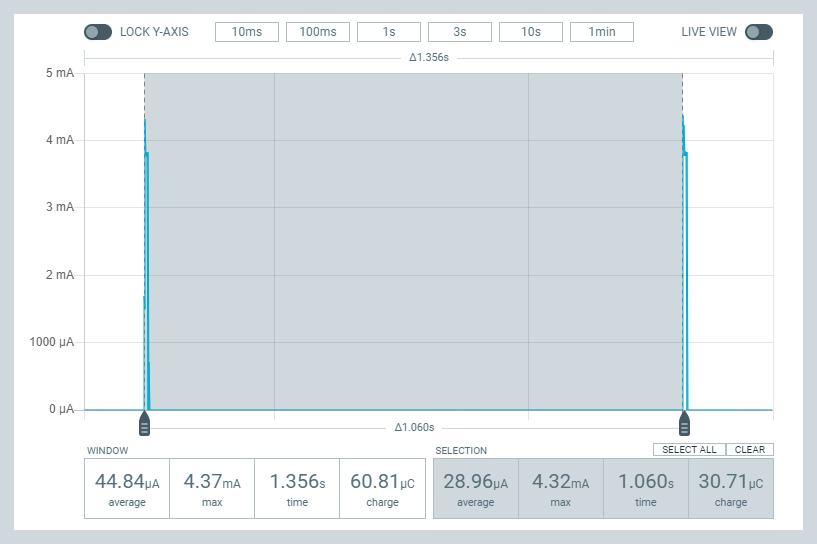
I'm including this screenshot of the Rx interval for completeness:
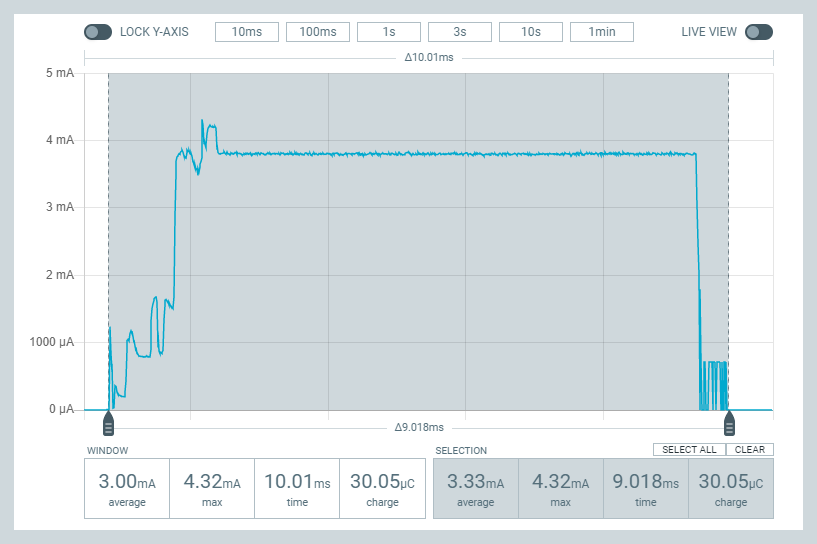
By the time it reaches 1.8v, it dies rapidly because it spends most of the 1 second duty cycle listening:
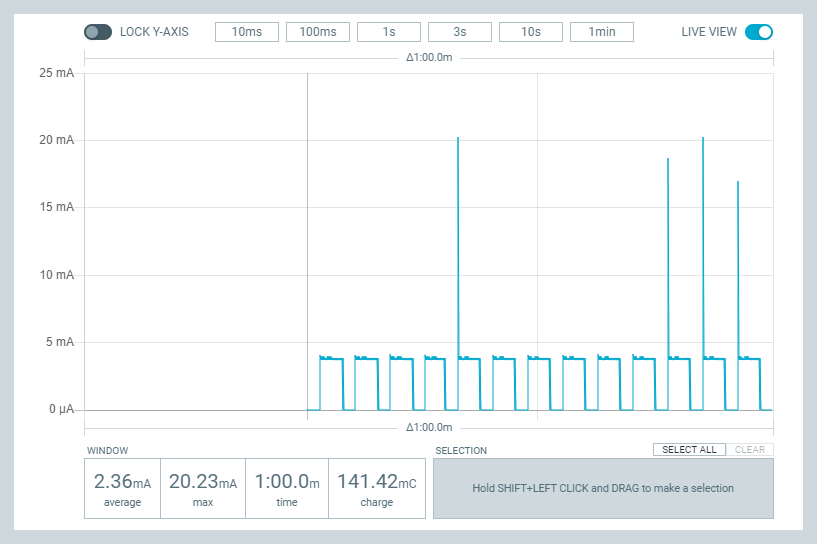
What the PPK2 doesn't do is simulate the voltage droop that a CR2032 can experience. Not at all sure what happens under those conditions, but maybe (probably?) it contributes to the seemingly short battery life. If that's the case, maybe these keyfinder receivers could be rehabilitated to last longer before needing a battery replacement.
By the way, when I checked the voltage remaining on the coincell taken from this keyfinder receive, it measures about 3mv. So, it got drained practically all the way to zero.
Anyhow, according to energizer, their CR2032 has 235mah of capacity when measured from fresh down to 2.0v (https://data.energizer.com/pdfs/cr2032.pdf). So, doing the math on that, assuming a 35ua burn rate, it should theoretically last 279 days, or about 9 months. That would be the lower bound. If one assumes 29ua as the burn rate, then it could last 11 months. That would be the upper bound. i.e. theoretically, it might last somewhere from 9-11 months. Definitely not two years. Also, I'm definitely got getting anything in that range on my keyfinder receiver tags--they die much sooner than that. I'm guessing it's CR2032 voltage droop that gets worse as the battery gets depleted which leads to premature failure. I wondering whether simply soldering in a suitably large value ceramic capacitor between VCC and GND might help it power through the droop and live up to its design potential? Better yet, I'd be willing to trade off responsiveness for much better battery life. Rather than checking once per second, maybe it could be modified to listen much less often than that.
@NeverDie said in Most reliable "best" radio:
By the way, when I checked the voltage remaining on the coincell taken from this keyfinder receive, it measures about 3mv. So, it got drained practically all the way to zero.
I've seen this when playing with 328's and 8266's. When voltages drop to the min threshold, the devices fail into a funky state drawing big current. For that reason, my current designs give out a yelp at a moderately low voltage, if there is a radio attached. Then go into deep sleep hoping that a rescue arrives. Deep discharges are really problematic for rechargeable liOn batteries. The advice is to abandon the battery because of potential changes to chemistry and the risk of fire on recharge.
-
@NeverDie said in Most reliable "best" radio:
By the way, when I checked the voltage remaining on the coincell taken from this keyfinder receive, it measures about 3mv. So, it got drained practically all the way to zero.
I've seen this when playing with 328's and 8266's. When voltages drop to the min threshold, the devices fail into a funky state drawing big current. For that reason, my current designs give out a yelp at a moderately low voltage, if there is a radio attached. Then go into deep sleep hoping that a rescue arrives. Deep discharges are really problematic for rechargeable liOn batteries. The advice is to abandon the battery because of potential changes to chemistry and the risk of fire on recharge.
@Larson said in Most reliable "best" radio:
@NeverDie said in Most reliable "best" radio:
By the way, when I checked the voltage remaining on the coincell taken from this keyfinder receive, it measures about 3mv. So, it got drained practically all the way to zero.
I've seen this when playing with 328's and 8266's. When voltages drop to the min threshold, the devices fail into a funky state drawing big current. For that reason, my current designs give out a yelp at a moderately low voltage, if there is a radio attached. Then go into deep sleep hoping that a rescue arrives. Deep discharges are really problematic for rechargeable liOn batteries. The advice is to abandon the battery because of potential changes to chemistry and the risk of fire on recharge.
What kind of device/component do you use to make the yelp sound? I've looked for tiny piezo's that could maybe do this, but they all seem to be different degrees of large. I know it should be possible to be tiny, becaue, for example, a digital wristwatch is able to make audible beeps. On the other hand, after looking at some teardowns, I guess digital watches uses piezo disks that are at least 1/2" in diameter. Hmmmm.... Is that really as small as it gets? Anyone here know? What about hearing aids? Surely they have something smaller. The smallest thing I've found so far has been this: https://owolff.com/page140.aspx?recordid140=534&output=pdf&delay=3000&margin=1cm which is 5mm in diameter. So, I guess forget mounting anything directly to the PCB board: wired discs are the way it's done apparently and then just tuck it somewhere inside the project enclosure.
-
@Larson said in Most reliable "best" radio:
@NeverDie said in Most reliable "best" radio:
By the way, when I checked the voltage remaining on the coincell taken from this keyfinder receive, it measures about 3mv. So, it got drained practically all the way to zero.
I've seen this when playing with 328's and 8266's. When voltages drop to the min threshold, the devices fail into a funky state drawing big current. For that reason, my current designs give out a yelp at a moderately low voltage, if there is a radio attached. Then go into deep sleep hoping that a rescue arrives. Deep discharges are really problematic for rechargeable liOn batteries. The advice is to abandon the battery because of potential changes to chemistry and the risk of fire on recharge.
What kind of device/component do you use to make the yelp sound? I've looked for tiny piezo's that could maybe do this, but they all seem to be different degrees of large. I know it should be possible to be tiny, becaue, for example, a digital wristwatch is able to make audible beeps. On the other hand, after looking at some teardowns, I guess digital watches uses piezo disks that are at least 1/2" in diameter. Hmmmm.... Is that really as small as it gets? Anyone here know? What about hearing aids? Surely they have something smaller. The smallest thing I've found so far has been this: https://owolff.com/page140.aspx?recordid140=534&output=pdf&delay=3000&margin=1cm which is 5mm in diameter. So, I guess forget mounting anything directly to the PCB board: wired discs are the way it's done apparently and then just tuck it somewhere inside the project enclosure.
@NeverDie said in Most reliable "best" radio:
What kind of device/component do you use to make the yelp sound?
My present "Yelp" design comes from a Thingspeak script that sends an email. Yelp may have been the wrong word, but I was thinking of smoke detectors that beep to say, "I'm dying, replace my battery". Previously, I built a WiFi mouse trap that sent email/text/phonecall via SMTP2GO if the trap was tripped (mouse, or no mouse). That was fun! That code could easily be modified to trigger on a voltage threshold, or any other variable.
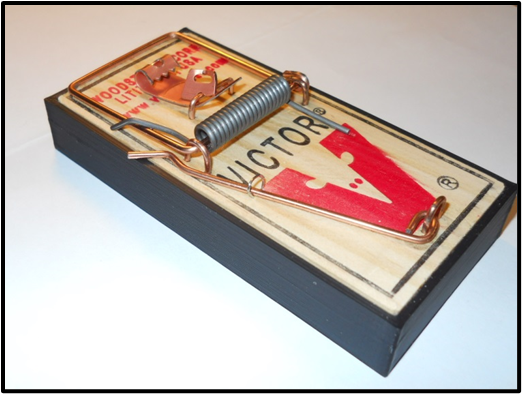 image url)
image url) -
@NeverDie said in Most reliable "best" radio:
What kind of device/component do you use to make the yelp sound?
My present "Yelp" design comes from a Thingspeak script that sends an email. Yelp may have been the wrong word, but I was thinking of smoke detectors that beep to say, "I'm dying, replace my battery". Previously, I built a WiFi mouse trap that sent email/text/phonecall via SMTP2GO if the trap was tripped (mouse, or no mouse). That was fun! That code could easily be modified to trigger on a voltage threshold, or any other variable.
 image url)
image url)@Larson That's a nice, clean looking, elegant design. If you have any idea on how to kill skunks, let me know. They are destroying my lawn. Live capture doesn't seem practical for skunks, for obvious reasons. I've seen one youtube that demonstrates a deadfall device--and proves it works--but it's the only example I've managed to find. There do exist professional services, but they charge a couple hundred bucks per animal removed, but after removal they can't legally release them (because they are officially pests), so the pro's just end up killing them anyway.
-
@Larson That's a nice, clean looking, elegant design. If you have any idea on how to kill skunks, let me know. They are destroying my lawn. Live capture doesn't seem practical for skunks, for obvious reasons. I've seen one youtube that demonstrates a deadfall device--and proves it works--but it's the only example I've managed to find. There do exist professional services, but they charge a couple hundred bucks per animal removed, but after removal they can't legally release them (because they are officially pests), so the pro's just end up killing them anyway.
@NeverDie For skunks, and racoons I use an electric fence. I string a wire around the lawns & ferns about 6" up from grade using non-conducting stakes. I think it works and is non-lethal. The e-fence was the smallest Coastal Farm offers. Our cat has 'figured' it out and knows to stay away.
In the spirit of radio electronics, I did build a system for mole elimination. It was complicated. I use a vibration detector/WiFi (ESPNOW) that sends notice to a piezo beeper inside the house. The detector is planted in the last active mole pile. If I hear the beeper I jump to action to hit a button (Transmit/Recieve pair) to ignite an electronic firecracker that would be burried in the last visited mole pile. I could have automated that button-pushing task, but the extra human control made it safer and more entertaining. The firecracker is be fitted with a nicrome wire fork, inplace of the normal fuse. The firecrackers I prepared were painted in some waterproof paint to keep them from degrading in the moist soil. An 18V Ryobi tool battery is used for the power source in the relay circuit because that gives enough juice to burn the nicrome wire. I tested it but have yet to deploy it. Here is the circuit for the igniter. image url)
image url) -
@NeverDie For skunks, and racoons I use an electric fence. I string a wire around the lawns & ferns about 6" up from grade using non-conducting stakes. I think it works and is non-lethal. The e-fence was the smallest Coastal Farm offers. Our cat has 'figured' it out and knows to stay away.
In the spirit of radio electronics, I did build a system for mole elimination. It was complicated. I use a vibration detector/WiFi (ESPNOW) that sends notice to a piezo beeper inside the house. The detector is planted in the last active mole pile. If I hear the beeper I jump to action to hit a button (Transmit/Recieve pair) to ignite an electronic firecracker that would be burried in the last visited mole pile. I could have automated that button-pushing task, but the extra human control made it safer and more entertaining. The firecracker is be fitted with a nicrome wire fork, inplace of the normal fuse. The firecrackers I prepared were painted in some waterproof paint to keep them from degrading in the moist soil. An 18V Ryobi tool battery is used for the power source in the relay circuit because that gives enough juice to burn the nicrome wire. I tested it but have yet to deploy it. Here is the circuit for the igniter. image url)
image url)@Larson Will a firecracker actually kill a mole? This guy shows off his simple contraption that uses 500v to instantly kill rodents:
https://www.youtube.com/watch?v=-xkOtVlDUbwThe key seems to be charging high voltage capacitors, so that enough current is released at 500v when triggered. I know: dangerous as hell, but maybe this is where your wireless human-in-the-loop firing trigger could come into play so that it doesn't kill anything that it's not supposed to.
He says it's highly effective.
I don't know whether something like that would work for moles or not. I guess it depends on whether they ever leave their holes to look for food or whether they stay underground all the time.
I wouldn't feel comfortable walking up to something charged to 500v, but maybe that's where radio electronics could completely disarm it down to zero volts when commanded before you even think of touching it. His is more basic and doesn't have that added feature. I would want redundant everything on the safety features so that there's no chance of it going wrong.
As for charging it up, I think one of these would work for fairly cheap:
https://www.amazon.com/gp/product/B07JG4K6S6/ref=ppx_yo_dt_b_search_asin_title?ie=UTF8&psc=1
as long as you terminate the charge when it gets to 500v and not let it continue on to 15,000 volts, which would destroy your charge capacitor. Since it comes in a pack of two, maybe the other one could be used to energize an electric fence? I know nothing about electric fences or what voltage they use, but I would hazard a guess that the circuitry is similar (flyback transformer design), and then all you would need is the right kind of wire and some insulated stakes.An electric fence is an interesting idea, provided it doesn't ignite dead leaves and create a fire. Not sure whether or not that's even a risk. I presume that professional electric fences wouldn't do that.
-
@NeverDie For skunks, and racoons I use an electric fence. I string a wire around the lawns & ferns about 6" up from grade using non-conducting stakes. I think it works and is non-lethal. The e-fence was the smallest Coastal Farm offers. Our cat has 'figured' it out and knows to stay away.
In the spirit of radio electronics, I did build a system for mole elimination. It was complicated. I use a vibration detector/WiFi (ESPNOW) that sends notice to a piezo beeper inside the house. The detector is planted in the last active mole pile. If I hear the beeper I jump to action to hit a button (Transmit/Recieve pair) to ignite an electronic firecracker that would be burried in the last visited mole pile. I could have automated that button-pushing task, but the extra human control made it safer and more entertaining. The firecracker is be fitted with a nicrome wire fork, inplace of the normal fuse. The firecrackers I prepared were painted in some waterproof paint to keep them from degrading in the moist soil. An 18V Ryobi tool battery is used for the power source in the relay circuit because that gives enough juice to burn the nicrome wire. I tested it but have yet to deploy it. Here is the circuit for the igniter. image url)
image url)@Larson Do you have any links to this please? I found next doors 2 new cats killing 2 young birds they had paicked out of the tree and onto my lawn. The owners are un-cooperative on the issue and the cats have been using my garden as their own litter tray..... Garlic, chilli powder and vinegar have had no effect so I need to up the game!
-
@Larson Do you have any links to this please? I found next doors 2 new cats killing 2 young birds they had paicked out of the tree and onto my lawn. The owners are un-cooperative on the issue and the cats have been using my garden as their own litter tray..... Garlic, chilli powder and vinegar have had no effect so I need to up the game!
-
@Larson Will a firecracker actually kill a mole? This guy shows off his simple contraption that uses 500v to instantly kill rodents:
https://www.youtube.com/watch?v=-xkOtVlDUbwThe key seems to be charging high voltage capacitors, so that enough current is released at 500v when triggered. I know: dangerous as hell, but maybe this is where your wireless human-in-the-loop firing trigger could come into play so that it doesn't kill anything that it's not supposed to.
He says it's highly effective.
I don't know whether something like that would work for moles or not. I guess it depends on whether they ever leave their holes to look for food or whether they stay underground all the time.
I wouldn't feel comfortable walking up to something charged to 500v, but maybe that's where radio electronics could completely disarm it down to zero volts when commanded before you even think of touching it. His is more basic and doesn't have that added feature. I would want redundant everything on the safety features so that there's no chance of it going wrong.
As for charging it up, I think one of these would work for fairly cheap:
https://www.amazon.com/gp/product/B07JG4K6S6/ref=ppx_yo_dt_b_search_asin_title?ie=UTF8&psc=1
as long as you terminate the charge when it gets to 500v and not let it continue on to 15,000 volts, which would destroy your charge capacitor. Since it comes in a pack of two, maybe the other one could be used to energize an electric fence? I know nothing about electric fences or what voltage they use, but I would hazard a guess that the circuitry is similar (flyback transformer design), and then all you would need is the right kind of wire and some insulated stakes.An electric fence is an interesting idea, provided it doesn't ignite dead leaves and create a fire. Not sure whether or not that's even a risk. I presume that professional electric fences wouldn't do that.
@NeverDie said in Most reliable "best" radio:
Will a firecracker actually kill a mole?
I'm not sure. But the MoleCat100 uses the blast from a 22 blank, and that has to be close to the concussive force of a firecracker. Being under the dirt by about 4" has to also help in rendering an effective shock wave since dirt is far less compressible than air.
@NeverDie said in Most reliable "best" radio:
The key seems to be charging high voltage capacitors, so that enough current is released at 500v when triggered.
Smoking Cool, and yea, probably dangerous. I was playing with flash bulb circuits from disposable cameras as a potential igniter. I accidently shorted a loaded circuit, and the thing burned a hole in my screw driver. Stunned and temporarily blinded, I put it away immediately and haven't gone back since. I don't think the 500 V device would work on moles; they do their foraging in their tunnels. Probably grubs and worms. Maybe they come out at night?
MouseTrapMonday has probably featured this 500 V device. He has quite a collection.
The Comidox 15KV looks like fun, and again dangerous. Glad to see that the thing comes disassembled. Assembly provides some knowledge requirement at least.
My electric fence is this one. It seems to have internal circuitry that limits grounding problems. The thing sends pulses at about 1Hz. Using a blade of grass, or green straw one can feel the pulses. I've had branches fall on the fence and pin it to the ground without resulting in problems so far. It would be fun to do a tear-down to learn how they work... but I've got these radios to play with.
-
@Larson Do you have any links to this please? I found next doors 2 new cats killing 2 young birds they had paicked out of the tree and onto my lawn. The owners are un-cooperative on the issue and the cats have been using my garden as their own litter tray..... Garlic, chilli powder and vinegar have had no effect so I need to up the game!
@skywatch said in Most reliable "best" radio:
Do you have any links to this please?
Sure, Here it is on Amazon. I got mine at Coastal Farm and Ranch. While I'm now using it for skunks and racoons, I initially used it on the swim platform of my old wooden boat that was a party scene for sea otters. They can really stink up the boat after a winter.
-
@skywatch said in Most reliable "best" radio:
Do you have any links to this please?
Sure, Here it is on Amazon. I got mine at Coastal Farm and Ranch. While I'm now using it for skunks and racoons, I initially used it on the swim platform of my old wooden boat that was a party scene for sea otters. They can really stink up the boat after a winter.
@Larson Since it's fed by AC from the wall, I'm guessing it's a relatively straight forward transformer based design rather than a flyback circuit, but I'm no expert in such things. I presume there's some kind of circuit in addition which renders it safe and non-lethal. Probably best to go with something known to work safely like that for an electric fence and not go the flyback transformer route, especially since the price is so low to begin with.
-
@Larson Since it's fed by AC from the wall, I'm guessing it's a relatively straight forward transformer based design rather than a flyback circuit, but I'm no expert in such things. I presume there's some kind of circuit in addition which renders it safe and non-lethal. Probably best to go with something known to work safely like that for an electric fence and not go the flyback transformer route, especially since the price is so low to begin with.
@NeverDie I wouldn't know as I haven't studied power supplies outside of the engineering fundaments, yet. There is a version of these fences that use car batteries & solar charging. So they probably use different transformers.
I sure hope we didn't stink-up your thread with all this rodent-talk.
-
@NeverDie I wouldn't know as I haven't studied power supplies outside of the engineering fundaments, yet. There is a version of these fences that use car batteries & solar charging. So they probably use different transformers.
I sure hope we didn't stink-up your thread with all this rodent-talk.
@Larson said in Most reliable "best" radio:
I sure hope we didn't stink-up your thread with all this rodent-talk
No worries. I'm not a stickler for staying on topic. I always say go where the interest is.
-
@NeverDie said in Most reliable "best" radio:
Will a firecracker actually kill a mole?
I'm not sure. But the MoleCat100 uses the blast from a 22 blank, and that has to be close to the concussive force of a firecracker. Being under the dirt by about 4" has to also help in rendering an effective shock wave since dirt is far less compressible than air.
@NeverDie said in Most reliable "best" radio:
The key seems to be charging high voltage capacitors, so that enough current is released at 500v when triggered.
Smoking Cool, and yea, probably dangerous. I was playing with flash bulb circuits from disposable cameras as a potential igniter. I accidently shorted a loaded circuit, and the thing burned a hole in my screw driver. Stunned and temporarily blinded, I put it away immediately and haven't gone back since. I don't think the 500 V device would work on moles; they do their foraging in their tunnels. Probably grubs and worms. Maybe they come out at night?
MouseTrapMonday has probably featured this 500 V device. He has quite a collection.
The Comidox 15KV looks like fun, and again dangerous. Glad to see that the thing comes disassembled. Assembly provides some knowledge requirement at least.
My electric fence is this one. It seems to have internal circuitry that limits grounding problems. The thing sends pulses at about 1Hz. Using a blade of grass, or green straw one can feel the pulses. I've had branches fall on the fence and pin it to the ground without resulting in problems so far. It would be fun to do a tear-down to learn how they work... but I've got these radios to play with.
@Larson said in Most reliable "best" radio:
MouseTrapMonday has probably featured this 500 V device. He has quite a collection.
He's the one who demonstrated the dead fall skunk killer. He's also demoed some no-spray catch-and-release traps, but I don't see those as practical for anyone but the pro's. The way they work is interesting though: supposedly a skunk has to be able to raise its tail to spray, and the no-spray traps don't give them enough room to do that. The downside is that once you release a skunk from the no-kill trap, it can raise its tail and spray you, which is what happened to him in one of his videos.
-
@Larson said in Most reliable "best" radio:
MouseTrapMonday has probably featured this 500 V device. He has quite a collection.
He's the one who demonstrated the dead fall skunk killer. He's also demoed some no-spray catch-and-release traps, but I don't see those as practical for anyone but the pro's. The way they work is interesting though: supposedly a skunk has to be able to raise its tail to spray, and the no-spray traps don't give them enough room to do that. The downside is that once you release a skunk from the no-kill trap, it can raise its tail and spray you, which is what happened to him in one of his videos.
-
@NeverDie Hilarious.
Release problem: Nothing that a remote, a servo, a relay, and a radio couldn't solve. All of which would get sprayed anyway. Hmmm...
-
@Larson said in Most reliable "best" radio:
Hilarious
Uh... after finding and watching the dead fall video, I downgrade my "Hilarious" comment to "Interesting". Back to the joy of radios!
@Larson said in Most reliable "best" radio:
@Larson said in Most reliable "best" radio:
Hilarious
Uh... after finding and watching the dead fall video, I downgrade my "Hilarious" comment to "Interesting". Back to the joy of radios!
I know what you mean. Not sure why, but even if the crush physics are equivalent, somehow his design does seem more disturbing than having a giant falling bolder do the dirty work. On the other hand, at some level it's no worse than road kill, which happens all the time, and most people seem relatively dismissive about that.
In any case, thanks for your post and info regarding the electric fence.
-
As a first pass I tried running the RadiolLlb on these two 20dBm nRF24L01's with the default settings:
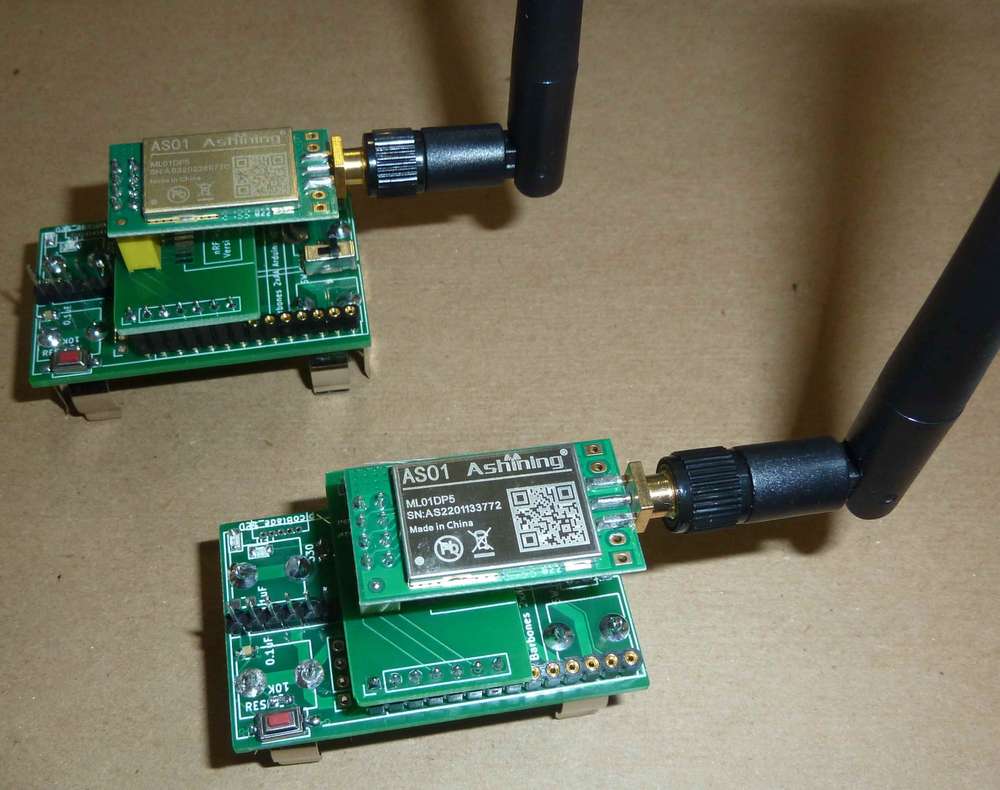
and although they work fine at closer ranges, they delivered zero packets (i.e. total fail) along my worst-case transmission path. Make of that what you will. I'll see if I can possibly tweak some settings for a better result and then re-test, but those are the early results. I thought them worth testing because many people here like the nRF24L01 radios and because those radios do have good support for over-the-air updates on the atmega328p.To be fair, there do exist some nRF24L01 modules on Aliexpress with even higher transmission power, so maybe a pair of those would cut the mustard.
I purchased them on amazon, mainly because I could receive them a lot faster than ordering something from China: https://www.amazon.com/dp/B07QC1SXJ8?psc=1&ref=ppx_yo2ov_dt_b_product_details
[Edit: same results even if I reduce the datarate to 250kbps. ]
Well, too bad. They do work for short range. Although this isn't rigorous testing by any means, I'm concluding that long-range for the nRF24L01, or other impairments, is essentially out of consideration Its niche is short-range, and for non-amplified versions preferably line-of-sight short-range. Sorry if that seems harsh, but for a comparison of different radio modules, somebody has to call it--and that's how I'm calling it. If somebody has a better nRF24L01 module that they feel would test better, please make a post and let us know what it is.
